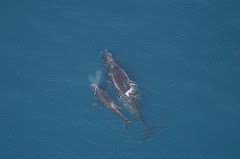How You Can Help Save the Endangered Right Whales
 |
North American Right Whale and Calf
Image Credit: Florida Fish and Wildlife Conservation Commission,
NOAA Research Permit #665-1652
|
The coastal waters off Georgia and Florida are the only known calving areas. In fact, the first right whale calf of the 2018-2019 season was spotted on December 28 near the mouth of the St. Johns River, swimming north.
Right whales were nearly hunted into extinction, but today the major threats are from ship strikes or becoming entangled in fishing gear.
Aerial surveys are conducted by the Fish and Wildlife Research Institute from December through March to help reduce ship strikes, but whale spotters can relay information to a central number to notify boaters, harbor pilots and ships' captains of their locations.
Become a Right Whale Spotter
The Nassau County Sierra Club and the Amelia Island Right Whale action group have arranged training sessions in Nassau County for right whale spotters. Julie Alpert from the Marine Resources Council of Palm Bay will conduct two free Right Whale Sighting Workshops on how to spot the whales and report the sightings. They especially want to train folks who live in beachfront homes or high-rise condos.
The training sessions will last for two hours and will be held as follows:
Tuesday, January 22, 2019 at 4:00 pm at the Omni Hotel Conference Center in Amelia Island
Wednesday, January 23, 2019 at 10:00 am at Fernandina Beach City Hall Chamber Room
These training sessions will explain what to look for and what to do when you think you've made a sighting. Your help can make a difference! Knowing where the whales are located helps watercraft to avoid them.
These beautiful creatures can be seen with the naked eye or through binoculars, camera lens, or telescope. Call the hotline 1-888-97-WHALE if you spot a right whale. This triggers follow-up by an experienced team that tracks and documents whale sightings with cameras and GPS units.
If you don't wish to be a spotter, but are interested in whale watching, check out The Ultimate Guide to Northern Right Whale Watching in Florida.



Comments
Post a Comment